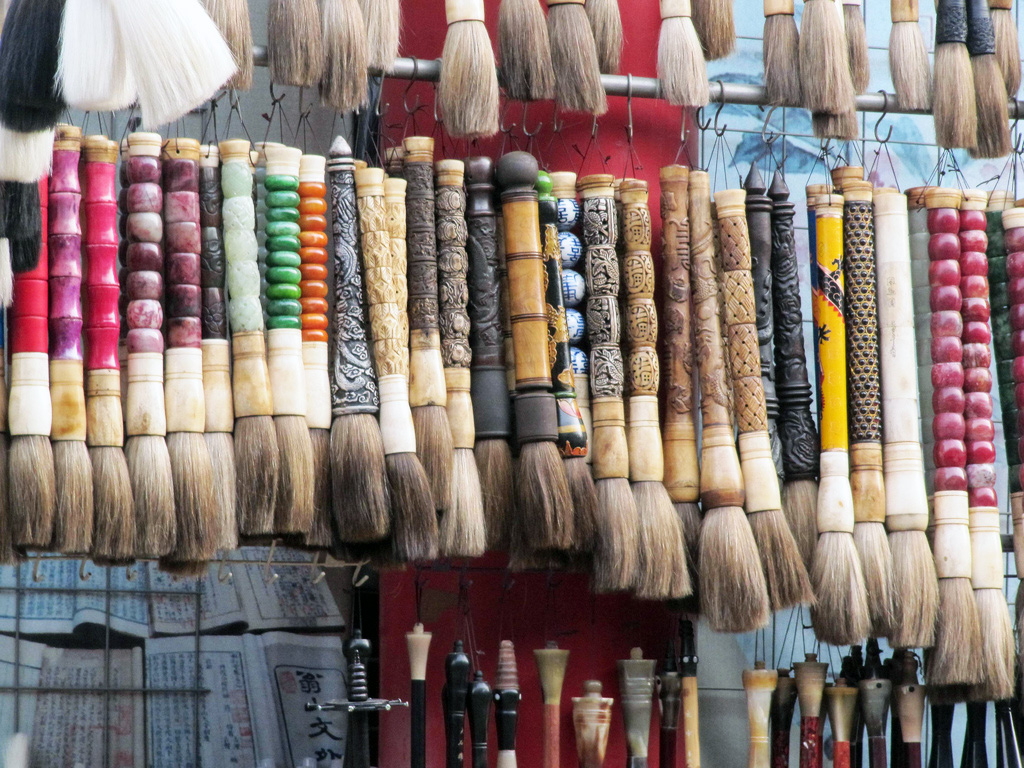
Writing brushes hanging in a stall at Pan Jia Yuan, the largest antique market in Beijing. Photo © Ivan Walsh, licensed Creative Commons Attribution.
Between the bargains and the bargaining, one of the most fun aspects of living in China is the shopping, especially in the local markets. For those with high tastes and a high cash flow to match, China’s shopping districts are filling up with international designer stores like Tiffany, Gucci, and Coach that are the real deal but offer no deals. The price tags at high-end stores often list prices as high as or higher than what you would find at the same store back home. At the markets, however, it will take trial and error to discover just how low the negotiations can go. Plenty of times you’ll boast to a friend about how little you paid for something, only to discover your friend got it for half as much. Bargaining is expected in markets and small shops, but not in large department stores or supermarkets.Megamarts like Carrefour, Walmart, and Metro can be found all over the big cities and even in some of the smaller ones. As in the United States, these stores are chock-full of the types of goods consumers demand in their everyday lives. There are also plenty of smaller mom-and-pop shops that tend to offer better service without the maddening rush-hour crowds of the megamarts.Your city will probably have some specialty markets where similar goods are sold by multiple vendors under the same roof, such as shoe markets, electronics markets, antique markets, and of course the fresh food markets (which most people call a wet market). These markets are open during the day, but the really fun markets are the “night markets” where city streets or sidewalks are closed off to make way for vendors of silks, pirated DVDs, namebrand knockoffs, fake antiques, and quirky new inventions such as USB-powered heated socks.
Bargaining is expected in markets and small shops, but not in large department stores or supermarkets. The best way to discover if there is room to bargain is to ask, Keyi pianyi yidian ma? (Can you go a little cheaper?), a hard phrase to memorize but one that will save you lots of dough. They’ll reply with either bu keyi (nope) or keyi (sure), in which case you can proceed to bargain.
The rule of thumb is to cut a seller’s price in half and eventually settle on a price around two-thirds of the original quote, though at markets that cater to foreigners the “real” sell price may be as little as 10-25 percent of the original amount quoted. A good way to discover a fair price is to check out the item in two or three different shops, keeping in mind that in China you often won’t get the true price until you’ve walked away. There’s always some tension as sellers expect you to make a purchase if you inquire about a price.
In the beginning you’ll be overcharged quite a bit, but don’t worry about it. If the price sounds good to you, go for it. Have fun and be happy that you are helping the local economy. As your Chinese-language skills improve, they’ll see that you aren’t a fat-cat tourist but someone who is really in the know. They’ll give you better prices just for speaking the language.
Some belligerent foreigners who don’t understand the bargaining game criticize the quality of the goods or insult the seller with their words or body language. Try to remain polite—negotiating is a fact of life in Chinese commerce, and it is all part of the ritual. Making a seller lose face will not help your efforts. You’ll know you’ve arrived as a bargainer when after fierce and seemingly antagonistic negotiation you enjoy a good laugh with the seller and they offer you a freebie and a cup of tea. Now you are starting to fit in.
Excerpted from the Second Edition of Moon Living Abroad in China.